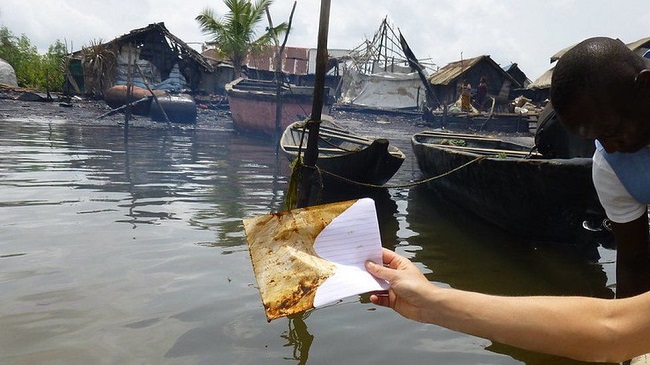The Supreme Court in the United Kingdom ruled on Friday, February 12, 2021 that two Nigerian communities, of more than 50,000 people combined, can bring their legal claims for clean-up and compensation against Royal Dutch Shell plc (RDS) and its Nigerian subsidiary, the Shell Petroleum Development Company of Nigeria (SPDC).

The Supreme Court ruling comes just two weeks after the Dutch Court of Appeal’s landmark ruling against RDS in litigation brought by four Nigerian farmers and Milieudefensie (Friends of the Earth Netherlands) against Shell which held RDS liable for pollution caused by its Nigerian subsidiary and ordered it to improve its pipeline network.
In this latest case, the UK Supreme Court overturned a split decision of the Court of Appeal and held that the two cases brought by the Ogale and Bille communities against Royal Dutch Shell are arguable and can proceed in the English courts.
The villagers say they have suffered systematic and ongoing oil pollution for years because of Shell’s operations in Nigeria, including the pollution of their drinking water.
Shell did not dispute that both communities have been severely polluted by its oil, or that there is yet to be an adequate clean-up of the pollution.
Instead, Shell argued that RDS could not be legally responsible for the harm the communities had suffered and so the cases should not be heard in England.
The communities, represented by law firm Leigh Day, have been fighting for five years to have their cases heard in the English courts. They are pursuing legal claims through the English Courts against RDS because they maintain that there is no prospect of obtaining justice in Nigeria.
The Supreme Court held that the approach of the majority in the Court of Appeal had been flawed in that:
- The Court of Appeal wrongly conducted a mini-trial of the facts at the earliest stage of the litigation, prior to the disclosure of relevant documents. The Court held that further disclosure was of “obvious importance” in these claims, thus rejecting the Court of Appeal’s approach which put an impossible evidential burden on claimants who seek to bring such claims.
- The Court of Appeal focused too narrowly on the issue of “control” by RDS of its subsidiary, when in fact parent company liability can arise in a variety of ways (as set out in Lungowe v. Vedanta 2019), including if a company publicly holds itself as exercising supervision and control but fails to do so.
- The Court of Appeal was wrong to hold that group-wide standards, policies and guidelines could never give rise to liability. Vedanta makes it clear that flawed Group policies could indeed give rise to liability.
The Supreme Court identified that the way in which RDS organised the Shell Group was significant and supported that RDS may be liable for the harm suffered by the Ogale and Bille communities. The Supreme Court emphasised the importance of two internal Shell documents that had only emerged after the initial High Court hearing. The court noted that none of Shell’s witnesses had referred to the content or even the existence of these crucial documents.
The judgment will have wider implications for claims against multinational parent companies whose subsidiaries cause harm to the environment through their group operations. It makes it clear that parent company liability can arise in a variety of ways, including by virtue of the parent company’s public commitments and its global policy framework.
Further, disclosure is likely to be crucial in parent company liability cases and it will be rare that such a case could be determined prior to trial in the absence of such disclosure in the future.
Leigh Day partner, Daniel Leader, who represents the claimants, said: “This Supreme Court judgment gives real hope to the people of Ogale and Bille who have been asking Shell to clean up their oil for years. We hope that now, finally, Shell will act.
“But it also represents a watershed moment in the accountability of multinational companies. Increasingly impoverished communities are seeking to hold powerful corporate actors to account and this judgment will significantly increase their ability to do so.”
In a reaction, Nnimmo Bassey, Director, Health of Mother Earth Foundation (HOMEF), said: “Call this the day of reckoning for polluting transnational oil or extractivist companies. Better late than never. Now, Shell must account for six decades of despoliation. And the Nigerian government and judiciary should be ashamed that Nigerians have to overseas to seek for justice.”
